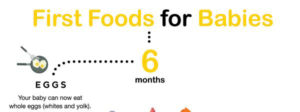Eggs for Baby

It’s ok to feed your baby the whole egg, starting at 6 months. It could even help prevent an egg allergy!
The newest infant feeding guidelines from Health Canada, the Canadian Pediatric Society, Dieticians of Canada and the Breastfeeding Committee of Canada now recommend introducing whole eggs starting at six months of age, or as soon as your child starts eating solid foods.
Experts no longer recommend delaying the introduction of common allergens to twelve months. In fact, research shows that introducing whole eggs early can actually help lower your baby’s chance of developing an egg allergy. For more information, please visit Health Canada.
Why eggs are an important part of your baby’s diet:
- Eggs have 14 essential vitamins and nutrients, including Vitamins A, D, E and B12, iron, selenium, zinc and folate
- One egg contains 6 grams of the highest quality protein
- Egg are a natural source of choline, which plays an important role in brain development
- Eggs are easy to chew and digest
- Eggs have a delicate taste that most children enjoy
You can start by gradually adding cooked eggs to your baby’s diet, with these simple tips:
- Hard cook a whole egg and mash it
- Mix about 1 ½ tsp (7 mL) with a little breast milk, infant formula or water
- Don’t add any salt, sugar, butter or margarine to the egg yolk
- Let your baby enjoy the natural flavors of single foods
* Remember to always ensure that your baby’s eggs are properly cooked to avoid food-borne illnesses, as baby’s immune systems are still continuing to develop at this stage of life.
Why eggs are an important part of your baby’s diet – and for mothers too!
A research team from the University of Alberta’s Department of Agriculture, Food and Nutritional Science published a study in The British Journal of Nutrition, in April 2014, which studied Alberta pregnancy outcomes and nutrition. More specifically, they focused on choline intake, including from eggs. Some key points are summarized below. Click here to read the full article.
- the need for choline increases during pregnancy and lactation because it plays a vital role in fetal brain development
- during both pregnancy and lactation, women who reported consuming one or more eggs during a 24-hour recall period were found to be significantly more likely to meet daily choline intake recommendations, compared with those who did not consume eggs
- the average choline intake was below the current daily recommendations; less than 25% of participants met the daily recommendation during pregancy, and only 10% did so during the lactation period
- eggs are one of the richest dietary sources of choline, containing approximately 130 mg of choline per medium (50 g) egg
